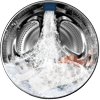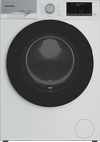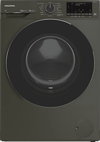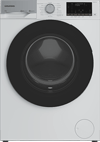World’s 1st Integrated Microfibre Filter
Grundig washing machines with FiberCatcher® technology catch up to 90% of microfibres during synthetic wash cycles
Breaking the microplastic cycle starts at home
#stopthecycle
FiberCatcher®
by Grundig
This is what happens in a cycle
without FiberCatcher®

Laundry cycles breaking the microplastic cycle
See FiberCatcher® Models
This is what happens in a cycle
without FiberCatcher®
Phase 1 – Into the water
Every time we wash our clothes, tiny microfibres can end up in our food chain. These microfibres can find their way into oceans causing significant environmental damage.
This is what happens in a cycle
without FiberCatcher®
Phase 2 – Marine life
Tiny, almost invisible particles, shed from our synthetic clothes and enter our water sources. Water that enters into marine life.
This is what happens in a cycle
without FiberCatcher®
Phase 3 – Our food
So when the cycle ends, we could have microplastics on our table. But we can stop that cycle. We have created a new washing machine with a built-in microfibre filter that with each synthetic cycle, helps to stop this microplastic cycle.
How much of a difference can a Grundig FiberCatcher® filter make in synthetic wash cycles?

Synthetic Wash Cycles
FiberCatcher® technology is only activated on synthetic wash programmes - Synthetics, Shirts, Sports along with selected programmes available to download from the HomeWhiz app. This ensures that only synthetic microfibres – that are currently the biggest concern for the environment – are filtered out and prevented from entering our precious waterways and oceans.
See FiberCatcher® Models
Keeping our food clean
of synthetic microfibres are filtered from ending up in our food cycle.

Using recycled materials
of the FiberCatcher® filter is made of recycled materials.
Prevent your clothes from damage with Grundig WaterCare® technology
By replacing vigorous drum movements with a jet of water and detergent that cascades in from the top of the drum, our WaterCare® technology ensures a quicker, gentler wash cycle for your garments; without sacrificing wash performance. WaterCare® also reduces the number of harmful microfibres that are released, helping to protect our water sources.
Grundig Washing Machines with FiberCatcher® Technology
Do you need a replacement
Grundig FiberCatcher® filter?
If your filter needs replacing, you can purchase a replacement one direct from us by clicking the button below. We'll get your new one in the post and you can return your old filter in the same box that your new one arrives in. #stopthecycle
Buy a new filterClick here to register your FiberCatcher® appliance.
Let us show you how easy it is to return your old filters to be recycled, view return guide.
* No Plastic in Nature (2019) for WWF by Dalberg and University of Newcastle, Australia. An average person could be ingesting approximately 5 grams of plastic every week.





